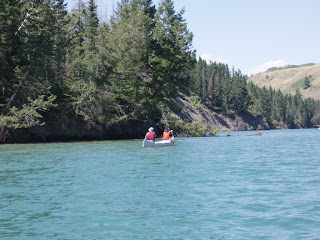 |
| Having a visit with my parents' dog, Casey |
In recent years, quite a few studies have looked at human
relationships with other animals, ranging from animals as
companions to their effects on blood pressure, stress, and minor health
problems.
For example, a 2009 study found that compared to a control group,
patients with acute depression who spent just thirty minutes with a dog experienced
a significant reduction in levels of anxiety.
Dog Owners More Likely to Be Alive One Year after a Heart Attack
A 1995 study published in the American Journal of Cardiology examined the effects of pet ownership and social support on patients’ one-year survival rates after a heart attack. The researchers discovered that heart-attack survivors who were also dog-owners were much less likely to die within one year than those without a dog. Interestingly, being a cat owner did not offer the same protection.The study also demonstrated that patients who had more social support were more likely to be alive after one year. The researchers suggest that both dogs and social support provide buffers against stress.
Caring for Other Animals
Some studies have also found that pets reduce feelings of loneliness
and social isolation.
In my research and conversations with veterans, I’ve learned
numerous stories about how a veteran’s a dog has supported him or her through the darkest hours. Animals keep post-traumatic stress survivors focused on the present
moment, and provide a reason to get up in the morning—a dog, for example, needs
to be fed and taken for a walk.
The act of caring for other animals can help to bring us out of ourselves
and become more open to the world around us.
References
Erika Friedmann and Sue A. Thomas, “Pet Ownership, Social
Support, and One-year Survival after Acute Myocardial Infarction in the Cardiac
Arrhythmia Suppression Trial (CAST),” The
American Journal of Cardiology 76 (1995): 1213-1217.
Andreas O. M. Hoffmann, Ah Hyung Lee, Florian Wertenauer,
Roland Ricken, Joanna J. Jansen, Juergen Gallinat, and Undine E. Lang,
“Dog-assisted Intervention Significantly Reduces Anxiety in Hospitalized
Patients with Major Depression,” European
Journal of Integrative Medicine 1 (2009): 145-148.







